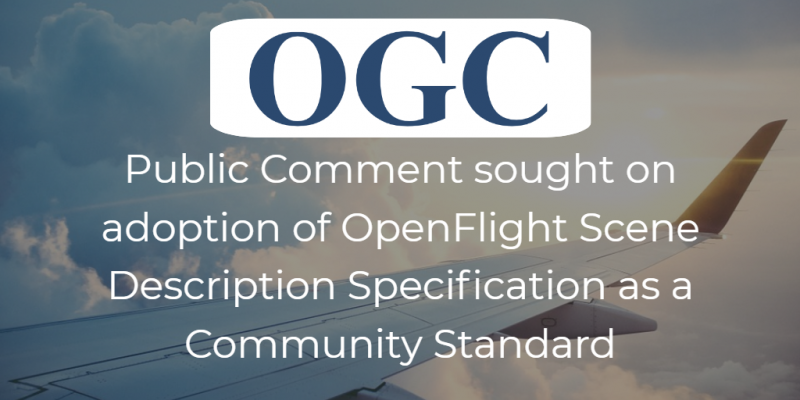OpenFlight is a 3D scene description file format widely used in the aviation simulation industry

The Open Geospatial Consortium (OGC) is considering the OpenFlight Scene Description Database Specification (v16.0) for adoption as an official OGC Community Standard. Public comment is sought before approval.
The OpenFlight Scene Description Database Specification, commonly referred to as simply “OpenFlight,” is a 3D scene description file format used for real-time visual simulation of 3D terrain features and moving models, such as ground and air vehicles.
OpenFlight was submitted to OGC for consideration as a community standard by its creator and maintainer, Presagis. While OpenFlight databases are often created and edited using Presagis software tools, the format is widely adopted and, as a result, many tools exist in the marketplace that are able to seamlessly read and write OpenFlight files.
The OpenFlight file format supports both simple and relatively sophisticated real-time software applications. The full implementation of OpenFlight supports variable levels of detail, degrees of freedom, sound, instancing (both within a file and to external files), replication, animation sequences, bounding volumes for real-time culling, scene lighting features, light points and light point strings, transparency, texture mapping, material properties, and many other features.
An OGC Community Standard is an official standard of OGC that is considered to be a widely used, mature specification, but was developed outside of OGC's standards development and approval process. The originator of the standard brings to OGC a “snapshot” of their work that is then endorsed by OGC membership so that it can become part of the OGC Standards Baseline.
The candidate OpenFlight Scene Description Database Specification community standard is available for review and comment on the OGC Portal. Comments are due by November 28, 2019, and should be submitted via the method outlined on the OpenFlight Scene Description Database Specification community standard's request page.
About OGC
The Open Geospatial Consortium (OGC) is an international consortium of more than 530 businesses, government agencies, research organizations, and universities driven to make geospatial (location) information and services FAIR – Findable, Accessible, Interoperable, and Reusable.
OGC's member-driven consensus process creates royalty free, publicly available geospatial standards. Existing at the cutting edge, OGC actively analyzes and anticipates emerging tech trends, and runs an agile, collaborative Research and Development (R&D) lab that builds and tests innovative prototype solutions to members' use cases.
OGC members together form a global forum of experts and communities that use location to connect people with technology and improve decision-making at all levels. OGC is committed to creating a sustainable future for us, our children, and future generations.
Visit ogc.org for more info on our work.
“







